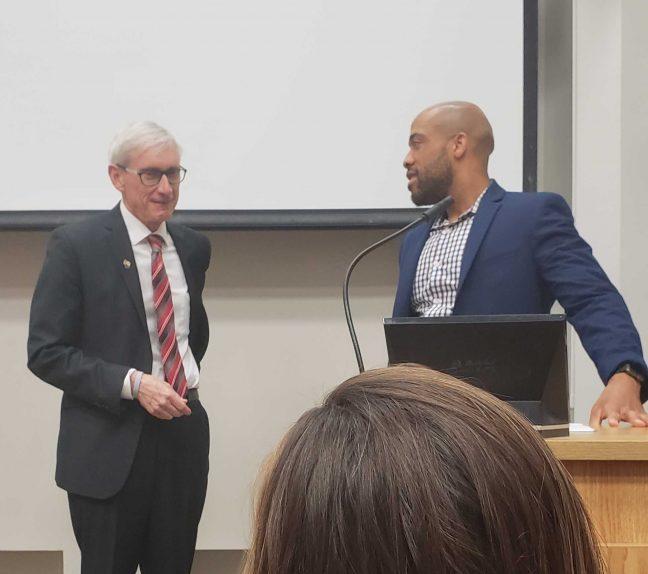Gov. Tony Evers and Lt. Gov. Mandela Barnes spoke to the University of Wisconsin College Democrats about education reform and combatting inequalities throughout the state Thursday night.
Evers described several issues pertaining to students that he hopes to change while in office. When he served on the Board of Regents as the state education superintendent, Evers said he had the opportunity to appoint members to that board. He hopes the board will implement strategies like creating student IDs that double as voter IDs to make it easier for students to vote — something he said should have already happened.
“We put language in there that will help each chancellor to create new student IDs that you use to vote. I have no idea why that hasn’t happened yet,” Evers said.
Evers also spoke about how he’s working to increase funding for the UW System. He said tuition is frozen and is working to fund that.
Tony Evers discusses school funding, future of WI public school system
Recently, the Wisconsin education system ranked low in terms of funding, especially when it came to K-12 education. He said it would be one of his top priorities to boost education both at the K-12 and university level, and said he would increase funding if that was the way to make that happen.
“We’re putting an extra 150 million into the UW System,” Evers said. “That has increased over last time, and we’re freezing tuition.”
Evers spoke about the upcoming 2020 elections, as presidential candidates are already beginning to campaign in Wisconsin. Sen. Bernie Sanders, I-Vt., for instance, held a rally last week at James Madison Park.
Evers said that it was up to UW students to not only vote in elections, but also to make their voices heard to every candidate who comes to speak. He urged students to “get in front of every darn campaign there is,” because votes in the battleground state of Wisconsin matter.
“Don’t make Wisconsin a flyover state,” Evers said. “This is the state that cost us the election [in 2016].”
Barnes spoke about a variety of issues impacting Wisconsin citizens, from disparities in access to healthcare and medical marijuana to natural gas research.
To fight climate change, Barnes said he would like to see new initiatives fund research into natural resources. He spoke in favor of legalizing medical marijuana, raising the minimum wage and reducing the impact of the opioid epidemic.
“We have real issues of inequality and inequity in Wisconsin. It’s one of the greatest racial disparities … there’s education, there’s employment, there’s healthcare access,” Barnes said. “And those disparities impact everybody, no matter who you are, no matter where you are in Wisconsin.”
Gov. Evers calls for recreational and medicinal marijuana prohibition changes in state budget
Overall, what’s most important was mobilizing people all across the state, Barnes said.
Barnes mentioned the recent state Supreme Court election in which Lisa Neubauer, who was favored by Democrats, lost to Brian Hagedorn, who was favored by Republicans. In a race as close as that one, where the margin of victory was so slim the election wasn’t fully decided for days, mobilizing as many people as possible matters, he said.
“We need you all, in this room,” Barnes said. “We have to do something better.”













